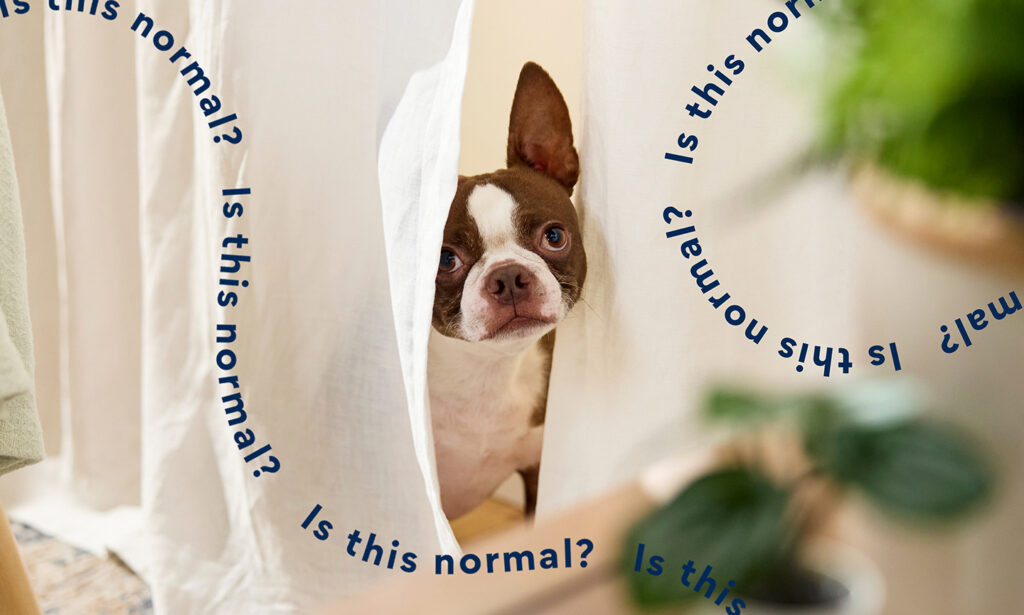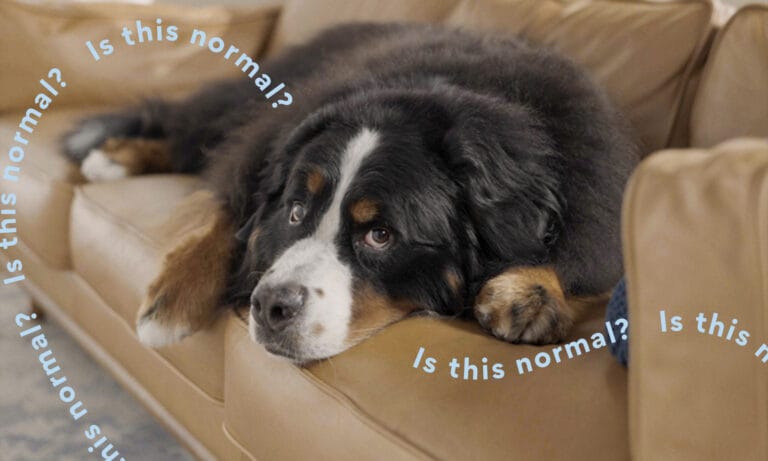Q: My dog is shaking, and I’m worried because I’m not sure what could be causing him to do this. Why do dogs shake? Is this normal?
A: If you’ve ever wondered, “Why is my dog shaking?” you may be surprised to learn that, just like humans, there are many reasons why dogs shake. Common causes include fear, excitement or anxiety, but shaking might also indicate something more serious, such as pain, an injury or a medical condition.
Why Do Dogs Shake?
“Dogs may shake or shiver for various reasons,” explains Dr. Julie Cappel, DVM, a veterinarian and veterinarian life coach based in Warren, Michigan. “Some may be normal, and some may indicate underlying disease.”
Common reasons dogs shake, according to our experts, include:
Fear or Anxiety
Some dogs shake when they are feeling fearful or anxious, says Dr. Bethany Hsia, DVM, a vet based in Clovis, California, and a co-founder of CodaPet, a startup supporting a network of mobile veterinarians.
Common causes of fear in dogs include:
- Loud noises
- Unfamiliar environments
- Separation from pet parents
- Thunderstorms
- New people or animals
What Should You Do?
While anxiety may not necessarily be dangerous, it could be detrimental to your pet’s overall wellness if they are nervous or anxious most of the time.
If the fear or anxiety is in response to people or other animals, Dr. Cappel recommends removing them from the situation.
If the trigger cannot be removed, such as a thunderstorm, Dr. Cappel recommends distracting them or giving them a safe place to hide. Additionally, you can try a dog calming aid, like a pheromone spray or calming treat.
See Chewy customers’ favorite dog calming aids.
Medication may also help ease their anxiety. “Some highly anxious dogs may be helped by medication, so consult your veterinarian for assistance,” Dr. Cappel says.
Cold
Similar to people, some dogs shake simply because they’re cold and their body is trying to regulate its temperature. “Shivering is a normal body response to feeling cold, and some dogs that are small or have short coats may shiver in cold weather,” explains Dr. Cappel.
What Should You Do?
Thankfully, there are quick and easy ways you can stop a cold dog from shaking. For starters, a chilly dog can be warmed up by bringing them into a warm environment and covering them with a blanket or putting a sweater or booties on them. Be careful not to overheat your dog, though, Dr. Cappel advises. “If they begin to pant, take off the sweater,” she says.
See Chewy customers' most-loved dog sweaters and dog coats.
Excitement
Another common reason a dog shakes is because they’re excited. “Trembling with excitement is normal and natural for many breeds, especially the working, sporting and herding breeds,” says Dr. Cappel. When a dog feels excitement from anticipation—such as when playing a game or waiting for a treat—it can cause them to shiver.
What Should You Do?
Rest assured, if your dog is shaking due to excitement, it’s nothing to worry about, says Dr. Cappel. However, if you’d like for them to calm down, simply remove them from the stimulant.
Video courtesy of Alexandra Bocci.
Old Age
Older dogs shiver or shake because they sometimes develop tremors in their old age. “As dogs age, they may experience a decline in muscle control, leading to involuntary shaking or tremors,” explains Dr. Hsia.
What Should You Do?
If you observe your older dog shivering or shaking, consult with your veterinarian. Since tremors in old age can be caused by an underlying health issue, a veterinary exam will help identify the specific cause and hopefully lead to an effective treatment or management plan.
Get tips on how to keep senior dogs happy and healthy.
Pain or Injury
A dog may shake as a result of an injury or pain due to the following causes:
- An accident or trauma
- Ingestion of a toxic substance
- An underlying medical condition
Other signs of pain include limping, whimpering, sleeping more and irritability.
“Dogs do not often cry out in pain, so a shaking response may be the only indication of underlying pain,” explains Dr. Cappel. This makes it all the more important not to ignore shaking in your dog.
What Should You Do?
A dog shaking because of pain or an injury is serious. “If your dog is shaking due to injury or pain, it is best to seek immediate veterinary care to address the source,” advises Dr. Hsia.
If you believe they have ingested a toxic substance (such as xylitol, chocolate, grapes, raisins, onions, garlic, alcohol, caffeine, avocado, macadamia nuts, nutmeg, among others), you should call the Pet Poison Helpline at (855) 764-7661.
Seizures
Seizures are sudden bursts of electrical activity in the brain which can cause tremors, partial, or full/grand mal seizures. Seizures can be caused by low blood sugar (hypoglycemia), epilepsy, infections (such as canine distemper), toxins, meningitis and more. “Epilepsy is a seizure disorder caused by a genetic brain problem or unknown cause,” Dr. Cappel explains. She shares that epilepsy often begins when a dog is between the ages of 1 and 5 years old and can affect any dog breed.
What Should You Do?
It’s essential to call your vet ASAP if you notice your dog shaking due to what might be a seizure. “Often, [grand mal seizures] are violent and obvious, but whenever you notice shaking in a dog that appears to be outside their control, or they seem unaware of their surroundings, consult a veterinarian immediately,” says Dr. Cappel. Treatment typically involves anticonvulsant medications.
Learn more about seizures in dogs.
Ear Infection
Head shaking may be linked to ear infections. “Ear infections can cause discomfort and shaking due to head tilting or ear scratching,” says Dr. Hsia.
What Should You Do?
Thankfully, ear infections can be helped with a visit to the vet, who will most likely prescribe your dog an antibiotic.
Shaker Syndrome
Shaker syndrome, also called idiopathic generalized tremor syndrome, is a condition that Dr. Hsia says is believed to be an autoimmune disorder that can cause generalized head and muscle tremors.
Shaker syndrome is also nicknamed “little white shaker syndrome” because it is often found in small white dogs, such as Maltese and West Highland White Terriers. Although it might be more common in smaller dogs, shaker syndrome can affect any breed.
What Should You Do?
If you suspect your dog has shaker syndrome, it’s vital to book a visit to the vet as soon as possible to figure out exactly what’s going on with your pet’s health. “Treatment typically involves corticosteroids and other immunosuppressive drugs,” explains Dr. Hsia.
My Dog Is Shaking—Should I See a Vet?
Witnessing your dog shaking may be alarming at times, but pet parents need to take the whole picture into context: Is your dog shaking while they’re going for a walk outside in freezing weather? Are they shaking during a loud thunderstorm? That said, experts recommend a trip to the vet as soon as possible if you’re unsure of the cause or suspect there’s a more serious reason.
“Always see your veterinarian if you are unsure about the cause of shaking,” recommends Dr. Cappel. “A complete exam and workup by a licensed veterinarian is the only way to diagnose and treat a medical condition causing your pet to shake.”
Taking a video at home may be useful to show your vet.
Dog Shaking FAQ
Q:
Why has my dog started shaking all of a sudden?
Q:
Should I be worried if my dog is shaking?
Q:
How do you calm a shaking dog?
Overall, a dog shaking isn’t too out of the ordinary, but you shouldn’t always assume it’s from a benign cause, such as excitement. If you see your dog shaking, take note of their surroundings and look for any additional symptoms. Always immediately call your pet if you suspect something more serious, such as a seizure or another medical issue.
To learn more about calming a dog, get vet advice on how to relieve stress.
Expert input provided by Dr. Bethany Hsia, DVM, a vet based in Clovis, California, and a co-founder of CodaPet, a startup supporting a network of mobile veterinarians; and Dr. Julie Cappel, DVM, a veterinarian and veterinarian life coach based in Warren, Michigan.
This content was medically reviewed by Chewy vets.
Learn more about dog behavior:
Share:






















